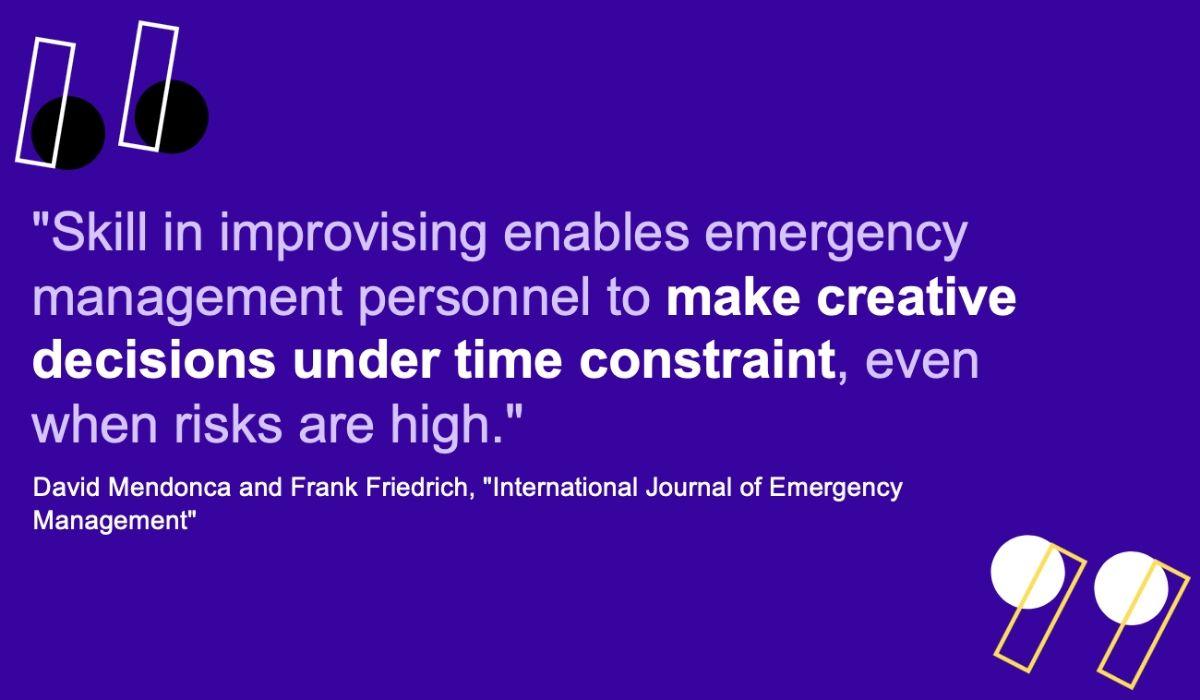Crisis Management is an Act of Improvisation
by The Second City
-
Mar 19, 2020

A colleague sent me this blog post a while back. I’m guessing it was sent to inspire or incite – it’s not clear which just yet. But the title read, “A Crisis is No Time for Improvisation.”
Really? Says who? Because research shows in study after study – over multiple decades – that organizational improvisation is at its most vital in the riskiest, most crisis-laden moments.
Harvard’s Ranjay Gulati teaches his students at the Harvard Business School about the explorer Ernest Shackleton, who had to improvise his way out of a shipwreck in the Antarctic Sea over 100 years ago in order to rescue his team. Gulati also explores the “other” Fukushima nuclear power plant, Daini, that was saved thanks to the improvised actions of site superintendent Naohiro Masuda.
Karl Weick, the esteemed organizational expert from the University of Michigan has written about this extensively. He studied such high risk occupations such as firefighters and aircraft carrier personnel, arriving at the conclusion that: “Organization is realized in moments of conversation and joint action that are embedded in day-to-day interactions.” He and his co-author Kathleen Sutcliffe go on to note:
“One pattern that seemed to recur was a sustained focus on small failures, less abstract specifics, ongoing operations, alternative pathways to keep going, and the mobilization of expertise. The variety within this pattern came from local customizing that produced meaningful practices that did not compromise the adaptive capacity that the pattern generated (“Managing The Unexpected,” Weik and Sutcliffe).
Incorporating small failures, dealing with abstractions while still acting, considering alternatives in real time without slowing down and deferring to front line expertise: that’s improvisation to its core.
There’s more.
Amy Ranking and her colleagues at Linkoping University in Sweden noted in a recent study that, “common characteristics of crisis situations are ambiguous and unplanned events. The need for improvised roles can therefore be an imperative factor for the success of the operation.”
And a group of scholars at the University of Siegen in Germany produced research that found that, “In medium to large crisis situations, the pressure on emergency response organizations (police, firefighters, administration, etc…) to collaborate with each other effectively increases. While some aspects of coping and recovery work are covered by negotiated procedures (sometimes prescribed by law) and trained routines, the variety of influencing factors and framing conditions always leads to a need for improvisation also at an inter-organizational level.”
Let’s remove the nuance. Bad improvisation won’t help in a crisis. But a crisis is rarely managed well in a ‘by the book’ manner or by individuals who are not steeped in the ability to be divergent thinkers and agile collaborators.
Yes, improvisation has been used to create amazing comedy. But improvisation is more than that. Improvisation is an orientation towards the unexpected and a practice in navigating complex human interactions while achieving an important goal. Put simply, crisis management is an act of improvisation.
More of
SCW Blog